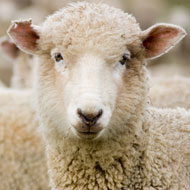First cases of blowfly strike reported

“The timing and severity of blowfly strike is strongly influenced by the weather" - Prof. Richard Wall.
Sheep farmers in the UK have reported the first blowfly strike cases of 2018.
According to the Elanco Blowfly Strike Tracker, the first reported incidents were in Hampshire, before spreading to Devon, West Sussex and Buckinghamshire.
Among the more serious cases includes a flock in Dorset, in which 50 per cent of lambs have been affected. The latest reports are in northern England and some initial cases in Scotland.
The NADIS and Elanco blowfly risk forecast suggests that weather conditions across the UK mean that flies are now active and that females are laying eggs. In turn, this can lead to serious welfare and productivity issues.
“The timing and severity of blowfly strike is strongly influenced by the weather. This is a reminder to farmers that now is the time to act for early prevention,” explained Richard Wall, professor of zoology at Bristol University. “Delaying treatment not only costs the farm but risks the welfare and productivity of the flock.
“Strike can develop very quickly, with the first maggots appearing within 12 hours of eggs being laid. Don’t get caught out.”
Elanco technical vet Fiona Hutchings urged farmers to use a preventative product early to reduce the risk of infection later in the season.
“The costs of inaction when it comes to blowfly strike far outweigh the costs of protection. With 99 per cent of farmers having suffered financial losses as a result of blowfly strike, the potential impact on your flock simply isn’t worth the risk,” she said.
“By the time symptoms show themselves, it’s often too late. It’s easy to overlook even one struck sheep, and blowfly strike can cause huge damage in very little time.



 The Federation of Independent Veterinary Practices (FIVP) has announced a third season of its podcast, Practice Matters.
The Federation of Independent Veterinary Practices (FIVP) has announced a third season of its podcast, Practice Matters.